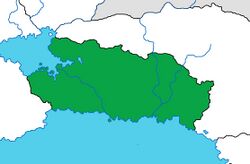Fina: Difference between revisions
mNo edit summary |
No edit summary |
||
| Line 135: | Line 135: | ||
}} | }} | ||
'''Fina''', officially the '''Republic of Fina''' (Finan: ''Republiken Fina'') is a country in northern [[Argis]], | '''Fina''', officially the '''Republic of Fina''' (Finan: ''Republiken Fina'') is a country in northern [[Argis]], sharing a border with [[Baltica]] to its west and a maritime border to its northwest with both [[Mokhavia]] and [[Safjal]] over [[Great Lakes of Argis|lake Omal]]. At roughly [NEW LAND AREA] km<sup>2</sup> ([NEW LAND AREA] mi<sup>2</sup>), Fina is the #th largest country in the northern Argic region. At a population of [NEW POPULATION] million people, Fina is populated at a density of approximately [NEW POPULATION DENSITY] people per square kilometer ([NEW POPULATION DENSITY]/sq mi), and ranks as the #th most populous nation in the region. The majority of the population lives in urban areas concentrated in the western third of the country. Located in this region is the capital of Kulleholm, and Fina's largest city, Karolinaburg. | ||
(2nd paragraph. Political system. Short history in 1 sentence. Link with present in 1 sentence. Head of state.) | (2nd paragraph. Political system. Short history in 1 sentence. Link with present in 1 sentence. Head of state.) | ||
Revision as of 00:09, 1 March 2022
This article is incomplete because it is pending further input from participants, or it is a work-in-progress by one author. Please comment on this article's talk page to share your input, comments and questions. Note: To contribute to this article, you may need to seek help from the author(s) of this page. |
Republic of Fina Republiken Fina (Finan) | |
|---|---|
| Motto: "För vår stora nation enad" "For our great nation united" | |
| Anthem: "Hjärtat av norr" "Heart of the North" | |
 Map of Fina and surrounding regions | |
| Capital | Kulleholm |
| Largest | Karolinaburg |
| Official languages | Finan |
| Recognised regional languages | Rankari Lámi |
| Demonym(s) | Finan |
| Government | Federal presidential constitutional republic |
• President | Linus Albertsson |
| Legislature | Riksdag |
| Establishment | |
• Arrival of Norse settlers from Ateenia | 300 |
• Unification into the Kingdom of Fina | 1724 |
• Civil War and foundation of the Finan Commune | 1915-1924 |
• Finan Revolution and establishment of a democratic government | 1989 |
| 1996-1999 | |
| Area | |
• Total | 268,000 km2 (103,000 sq mi) |
| Population | |
• Estimate | 12,963,541 |
• Density | 48.4/km2 (125.4/sq mi) |
| GDP (nominal) | estimate |
• Per capita | 15,000 |
| Currency | Finan krona (ⓚ) (FNK) |
| Time zone | UTC-1 |
| Date format | dd-mm-yyyy (CE) |
| Driving side | right |
| Calling code | +13 |
| ISO 3166 code | FN |
| Internet TLD | .fn |
Fina, officially the Republic of Fina (Finan: Republiken Fina) is a country in northern Argis, sharing a border with Baltica to its west and a maritime border to its northwest with both Mokhavia and Safjal over lake Omal. At roughly [NEW LAND AREA] km2 ([NEW LAND AREA] mi2), Fina is the #th largest country in the northern Argic region. At a population of [NEW POPULATION] million people, Fina is populated at a density of approximately [NEW POPULATION DENSITY] people per square kilometer ([NEW POPULATION DENSITY]/sq mi), and ranks as the #th most populous nation in the region. The majority of the population lives in urban areas concentrated in the western third of the country. Located in this region is the capital of Kulleholm, and Fina's largest city, Karolinaburg.
(2nd paragraph. Political system. Short history in 1 sentence. Link with present in 1 sentence. Head of state.)
(3rd paragraph. Economy in 2 sentences. International relations in 1 sentence.)
Etymology
The name Fina is believed to have originated from an old name for the Lámi people, the Finns, paired with Aroman suffix -ia and later just -a to indicate "land of". The Finn name was often used in the early Viking Age, being the name which the original !Norse settlers used for the Lámi. The name Finn is likely derived from the !Old Norse word finna, further deriving from the proto-Dolchic finþanan meaning "to find." This likely referred to the Lámi's hunter-gatherer lifestyle, where they "found" their food rather than grow it. The term was dropped for the Finan Sapp, and the native language-derived Lámi, however does survive through its modern use as a component of the etymology of the country which houses the people for which it is named.
Geography
(Landscape. Climate.)
History
Politics
(Government. Political parties. Foreign relations. Military.)
Economy
(Energy. Transport. Media.)
Demographics
(Ethnic groups. Language. Religion. Health. Education.)
Culture
(Literature. Visual arts. Music. Cuisine. Sport.)

